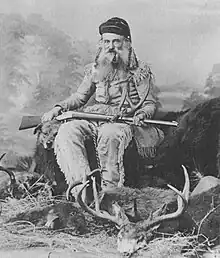Stephen Meek
Stephen Hall L. Meek (July 4, 1807 – January 8, 1889) was a fur trapper and guide in the American west, most notably a guide on a large wagon train that used a trail known as the Meek Cutoff. A native of Virginia, both he and his younger brother Joseph Meek would spend their lives as trappers west of the Rocky Mountains.
Stephen Meek | |
|---|---|
 | |
| Born | July 4, 1807 |
| Died | January 8, 1889 (aged 81) |
| Occupation(s) | Trapper, Guide |
| Spouse | Elizabeth Schoonover |
Early years
Stephen Meek was born in Washington County, Virginia on July 4, 1807.[1] In his autobiography, he claims to be a relative of President James K. Polk,[2] and the claim is corroborated by his brother.[3] He was educated in the local public schools in Virginia before beginning work for William Sublette in 1827.[1] He began working as a laborer for Sublette's Rocky Mountain Fur Company in St. Louis, Missouri. Soon, however, he became a trapper for a variety of companies.
American West
Meek joined an expedition with Benjamin Bonneville in 1831 as a trapper while Bonneville was exploring the Great Salt Lake. From 1833 to 1834, he traveled to California with Joseph R. Walker.[4] Meek moved to the Oregon Country in 1835 and began working at the Hudson's Bay Company's Fort Vancouver for John McLoughlin.[1] This included trips to California with Thomas McKay.[1]
In 1841, Meek bought the first lot of the Oregon City, Oregon, townsite from John McLoughlin, and helped to survey the land.[1][4] He joined the American mountaineers that year for one year. The following year, he served as a guide for a wagon train of pioneers to the Willamette Valley from Fort Laramie, and in 1845 led the ill-fated group that followed him from the Oregon Trail on the Meek Cutoff.[4] That party split at Fort Hall from the main party that included Joel Palmer and Sam Barlow.[1] In May 1845, he married Elizabeth Schoonover at St. Louis, Missouri. They had one son, George.[1] The Meeks would reside at Linn City, Oregon, until 1848.[1]
Later years
Meek would later spend time in the mines of the California Gold Rush before settling in Siskiyou County, California.[4] In 1850, he briefly returned to the Oregon Territory, before returning to California, continuing to mine until 1865.[1] In 1865, Elizabeth died, and he returned to working as a guide and trapper.[1] Stephen Meek died in Etna, California, on January 8, 1889, at the age of 81.
See also
- Harney Basin
- Lost Blue Bucket Mine
- Malheur River
- Meek's Cutoff, a film about the cutoff trail
References
- Corning, Howard M. (1989) Dictionary of Oregon History. Binfords & Mort Publishing. p. 164.
- Meek, Stephen (1948). The Autobiography of a Mountain Man. Pasadena, CA: G. Dawson.
- Eleven years in the Rocky Mountains and a life on the frontier, Chapter 35
- Palmer, Joel. Palmer's Journal of Travels Over the Rocky Mountains, 1845–1846 (1847), Library of Congress catalog F592 .T54 vol. 30. p. 40.